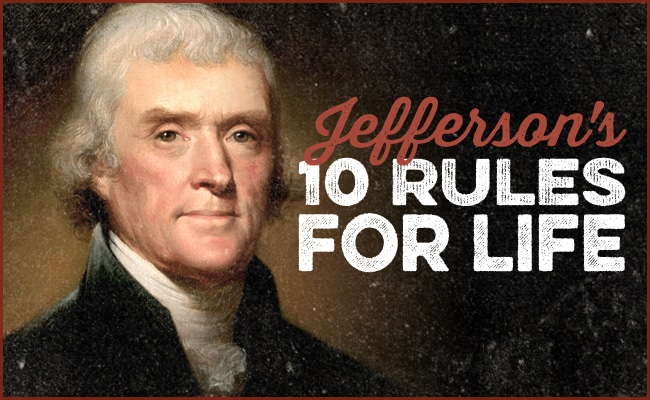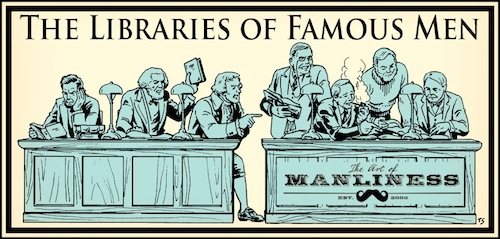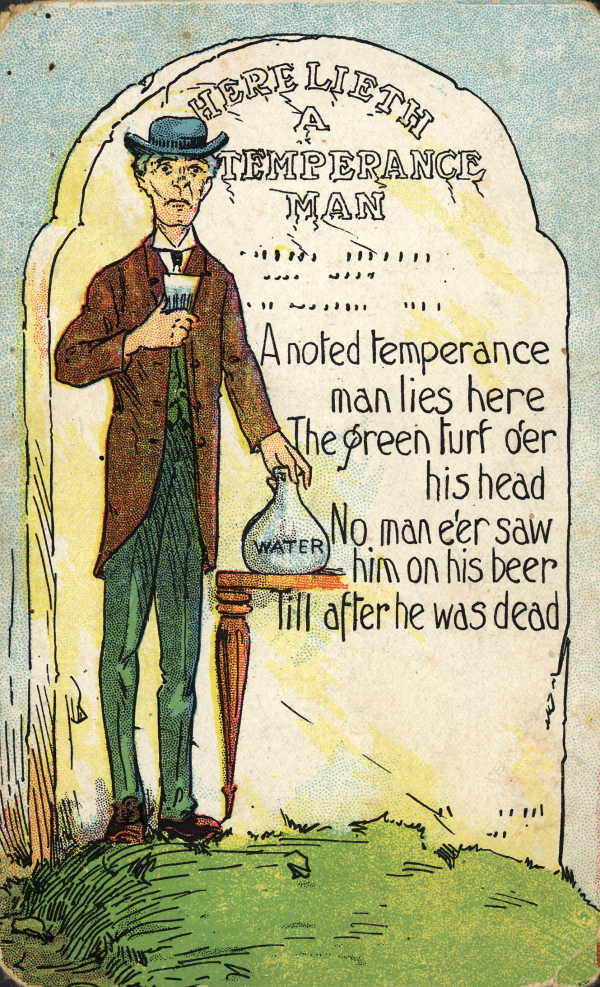
Like many of the Founding Fathers, Thomas Jefferson was a dad. And like a lot of dads, he often took the opportunity to dispense unsolicited dad advice to his children. Over the years, he developed a list of ten life rules he would share with his children, grandchildren, and friends looking for guidance on parenting their kids. Many of his maxims came from his readings of classical philosophers like the Stoics.
In an 1825 letter to John Spear Smith, Jefferson laid out his refined list of adages that he called his “Decalogue of Canons for observation in practical life.” The list made it out to the public and was republished in newspapers and magazines throughout the country in the 19th century.
While the advice is nearly 200 years old, it’s still applicable today. Below we share Jefferson’s ten rules of conduct along with links to further AoM resources to better help you live them.
1. Never put off till tomorrow what you can do today.
Procrastination can be a significant stumbling block to achieving success in life. If you’re a student and put off studying until the last minute, you might not do as well on a test. If you wait to start saving for retirement until you’re in your 40s, you lose out on the power of compound interest.
Procrastination might seem difficult to overcome, but with some knowledge as to why we procrastinate, we can take proactive measures to help reduce its influence in our lives.
Check out these AoM resources on how to beat procrastination:
- Podcast #444: How to Use the Procrastination Equation to Start Getting Things Done
- Podcast #728: Improve Your Productivity With the Power of Deadlines
- Stop Procrastinating Today With Behavioral Science
- Practice Productive Procrastination
- Do It Now Video
2. Never trouble another for what you can do yourself.
While it’s true that no man is an island, there’s wisdom in learning how to cultivate a healthy amount of self-reliance in our lives. In many cases, practicing self-reliance is simply more efficient; instead of telling someone else what you need done, waiting around for them to get going on it, and then correcting the subpar way they decided to complete the task, you can take care of it yourself in the same amount of time. And maybe get some learning, growth, and/or satisfaction in the process.
While Jefferson seems to have been referring to a practical type of self-reliance with this rule, it’s also worth developing a self-reliant spirit — the ability to trust yourself and think and act independently of the opinions of others.
Check out these AoM resources on developing your self-reliance:
- Developing a Self-Reliant Mentality
- A Man’s Guide to Self-Reliance
- Podcast #384: What It Really Means to Be Self-Reliant
- 31 Journaling Prompts for Building Greater Self-Reliance
- AoM Skills Archives
3. Never spend your money before you have it.
Not all debt is bad (it can make homeownership and college possible), but too much of the wrong sort can be enslaving. As J. Reuben Clark observed:
Interest [on debt] never sleeps nor sickens nor dies; it never goes to the hospital; it works on Sundays and holidays; it never takes a vacation; it never visits nor travels; it takes no pleasure; it is never laid off work nor discharged from employment; it never works on reduced hours. … Once in debt, interest is your companion every minute of the day and night; you cannot shun it or slip away from it; you cannot dismiss it; it yields neither to entreaties, demands, or orders; and whenever you get in its way or cross its course or fail to meet its demands, it crushes you.
The more you reduce your debt, the more your peace of mind, security, and freedom to pursue opportunities will grow.
Check out these AoM resources on avoiding and paying down debt:
4. Never buy what you do not want, because it is cheap; it will be dear to you.
Often, cheap things can seem like a great deal. But if we buy something just because it’s discounted or less expensive than the alternatives, we may have to pay a premium in the long run. It might be that we don’t really need the thing, so it ends up as bandwidth-burdening clutter, or it might be that the item is such poor quality that it needs to be replaced or expensively fixed, which robs you of both money and time.
There are some things worth paying top dollar for; most other things aren’t worth buying at all.
Check out these AoM resources on keeping things simple:
- The Spiritual Disciplines: Simplicity
- Modern Maturity: Create More, Consume Less
- Minimalism Begets Manliness
- Podcast #699: The No-Nonsense Guide to Simplifying Every Aspect of Your Life
5. Pride costs us more than hunger, thirst, and cold.
Dante thought pride was the most damnable of the deadly sins. Other religious and spiritual thinkers felt similarly. St. Augustine and C.S. Lewis, for example, taught that pride was the root of all other sins and moral failures.
Pride elevates your sense of superiority so that you arrive at the irrational belief that the world revolves around you. And it prevents you from seeing when you need to make changes in your life (you don’t need to change when you already think you’re awesome!). Neglecting to curb your vices and cultivate your virtues leaves the garden of your character fallow and weed-ridden.
The antidote to pride is humility. Humility doesn’t mean you have to be a doormat and completely without self-regard. Instead, humility is the recognition that you aren’t the center of the universe and that even if you’ve already achieved considerable success, you still have plenty of room for learning and growth.
Check out these AoM resources on pride and humility:
- The Virtuous Life: Humility
- How to Fight Entitlement and Develop Gratitude in Your Kids
- Manvotional: False Pride
- Podcast #212: Ego Is the Enemy
6. We never repent of having eaten too little.
Our appetites drive us toward doing the things we need to do to survive, thrive, and reproduce — to eat, rest, copulate, seek novelty, gain status, etc. They lend life phenomenal charge and pleasure.
But our appetites can also lead us astray. We can easily fall into traps of inactivity and excess. We have to remember that our desires must be balanced, monitored, and managed. As Plato argued in his allegory of the chariot, our appetites can be our ally rather than our enemy if they’re properly harnessed.
It’s far more common to regret overindulging than under-indulging; in the latter case, while you leave a bit of pleasure on the table, you are compensated with the self-respect that comes with self-mastery.
Check out these AoM resources on practicing personal discipline:
- Don’t Take Your Marching Orders From Your Belly
- The Spiritual Disciplines: Fasting
- Podcast #488: Fasting as a Spiritual Discipline
- Podcast #842: What Happened to the Idea of Self-Control?
- The Kingship of Self-Control
- Podcast #531: How to Best Harness Your Willpower
- How to Strengthen Your Willpower and 20 Ways to Conserve It
7. Nothing is troublesome that we do willingly.
Some people have a tendency to go through life acting as if they’re constantly put upon. “I have to go to work.” “I have to volunteer for the potluck.” “I have to call my parents.”
Because they do these things out of a sense of foisted-upon obligation, they act resentfully and with a heavy dose of annoyance.
You don’t have to do anything. If you decide to do something, do so out of a sense of inner-directed volition. It will make the task much more pleasant for both yourself and others, and remind you that you’re an autonomous being. Be warned: being able to carry out everything you do willingly and without resentment requires the ability to say no to the things you don’t want to do. This can be scary, especially for chronic people-pleasers, but the “no muscle” gets stronger the more you exercise it.
Check out these AoM resources on getting things done with agency and autonomy:
- Don’t Should All Over Yourself
- Quit Being a Pushover: How to Be Assertive
- The 7 Habits: Be Proactive, Not Reactive
- How to Firmly Say No Without Coming Off Like a Jerk
- Podcast #407: How to Stop Being a Nice Guy
- Sunday Firesides: You Are Not Responsible for Other People’s Feelings
- The Autonomous Man in an Other-Directed World
8. How much pain have cost us the evils which have never happened!
It’s sensible to consider what may come to pass in the future to prepare for the exigencies ahead. But when we worry about things that won’t necessarily happen, which are outside our control, we experience needless anxiety, potentially doubling our pain; we not only experience emotional upset when a misfortune arrives in our lives, but in anticipating the arrival of that misfortune.
Thankfully, the reverse is also true: we can potentially halve life’s pain by only worrying about the things that actually happen and not those that only may occur.
Check out these AoM resources on managing anxiety and worry:
- Building Your Resiliency: Part VI – Quit Catastrophizing
- Podcast #782: Anxiety Is a Habit — Here’s How to Break It
- Podcast #316: An Introduction to Stoicism
- The Best Books to Read in Uncertain Times
- The 11 Cognitive Distortions That Are Making You a Miserable SOB
9. Take things always by their smooth handle.
Here’s another Stoic-inspired life rule from Jefferson. This saying comes from the Roman emperor Marcus Aurelius, who understood that there is an easier and a harder way to do just about anything.
Some people tend to go through life in “hard mode.” They think that if something isn’t difficult, they’re not doing it correctly. But while many good things are hard, the fact that something is hard doesn’t necessarily make it good.
Instead of assuming that your friction-filled course is the right one, ask yourself the question posed by author Greg McKeown: “What if this could be easy?”
Every prickly person or troublesome problem has a smooth(er) handle. Find it and let it be your leverage point.
Check out these AoM resources on taking things by the smooth handle:
10. When angry, count ten before you speak; if very angry, a hundred.
When you look back on the moments you regret most in your life, a fair number of them likely involved you being angry. And if these cringe-inducing, life- and relationship-damaging moments happen more often than you’d like, Jefferson’s advice to count to 10 when you’re angry or 100 if you’re very angry can be a tool to prevent your temper from getting the better of you.
The reason this advice works is that anger is a “hot” emotion. It comes on fast and strong but goes away just as quickly. If you can insert a pause in between a stimulus to anger and your reaction, you can prevent many a regrettable and destructive outburst.
Check out these AoM resources on managing anger:







